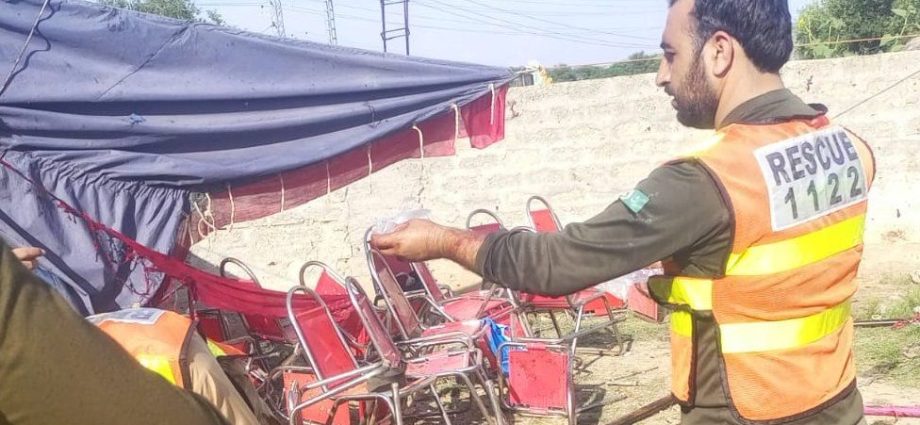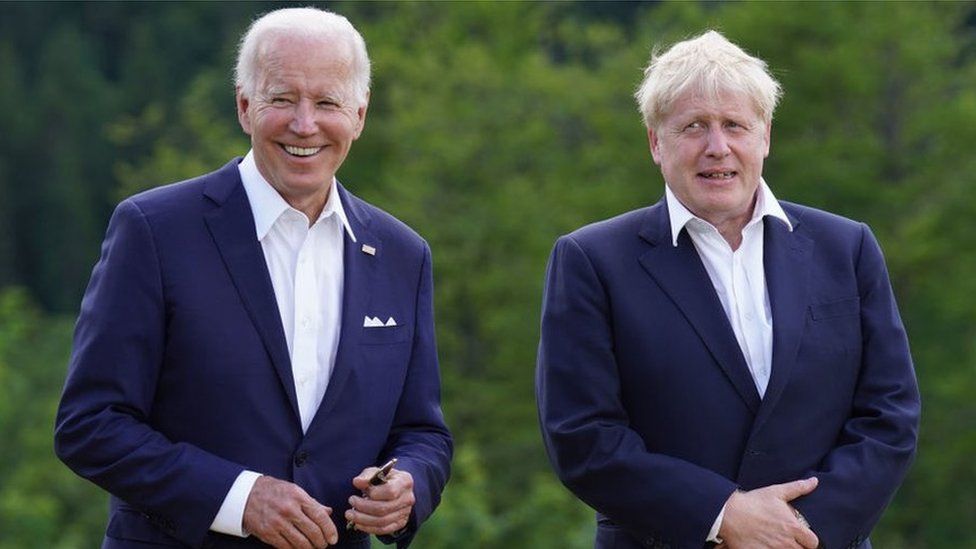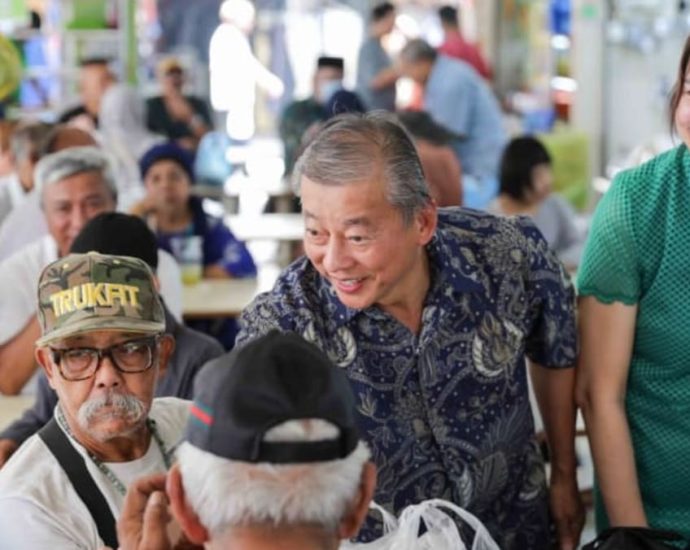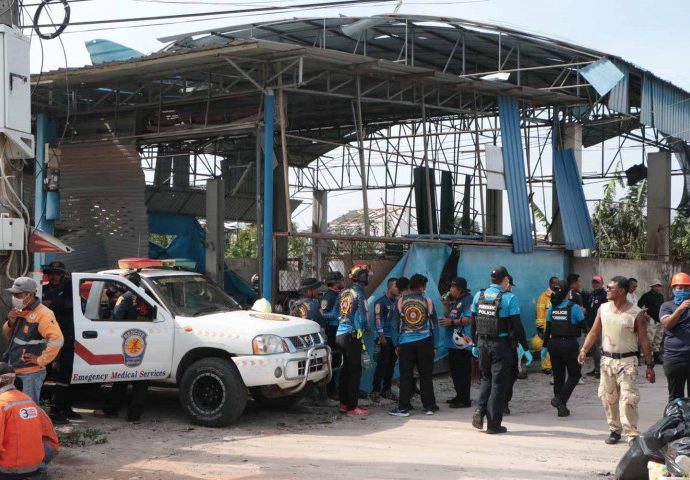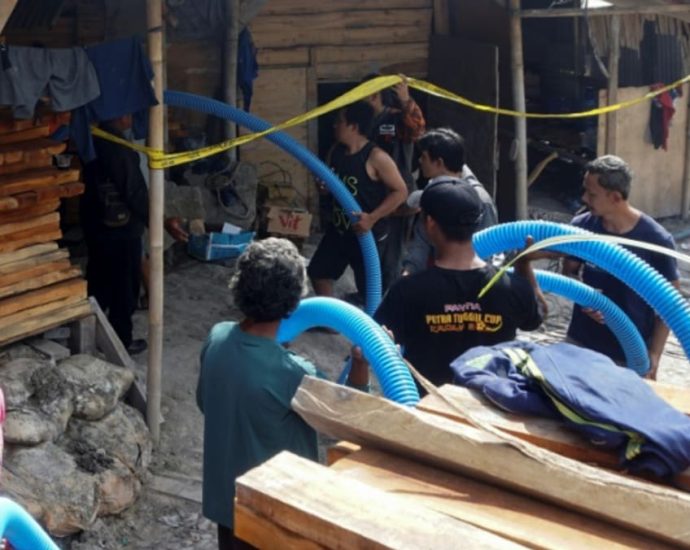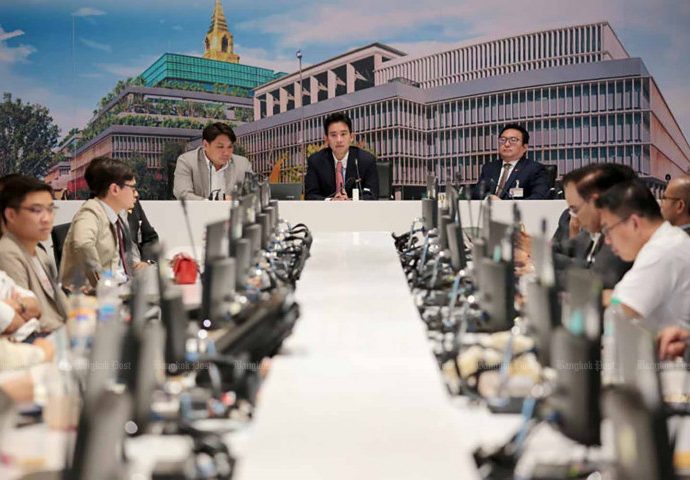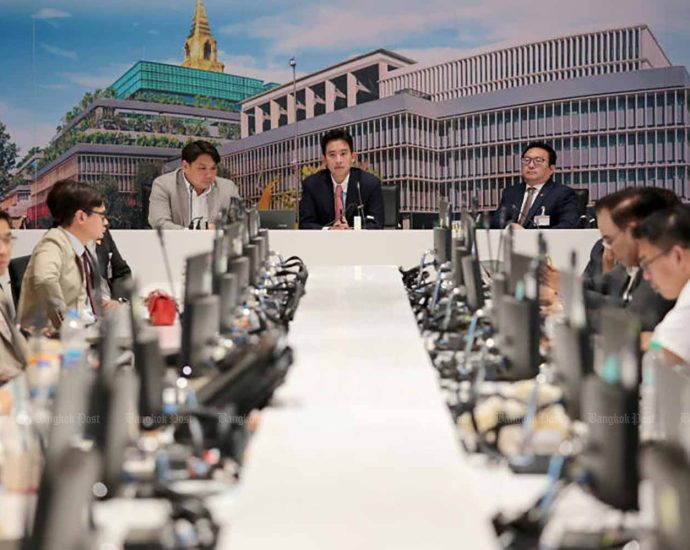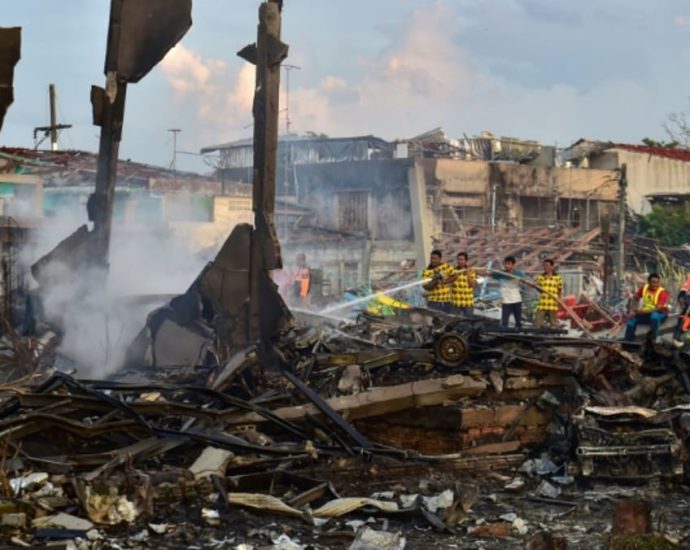At least 35 killed in Pakistan after explosion at Islamist political rally
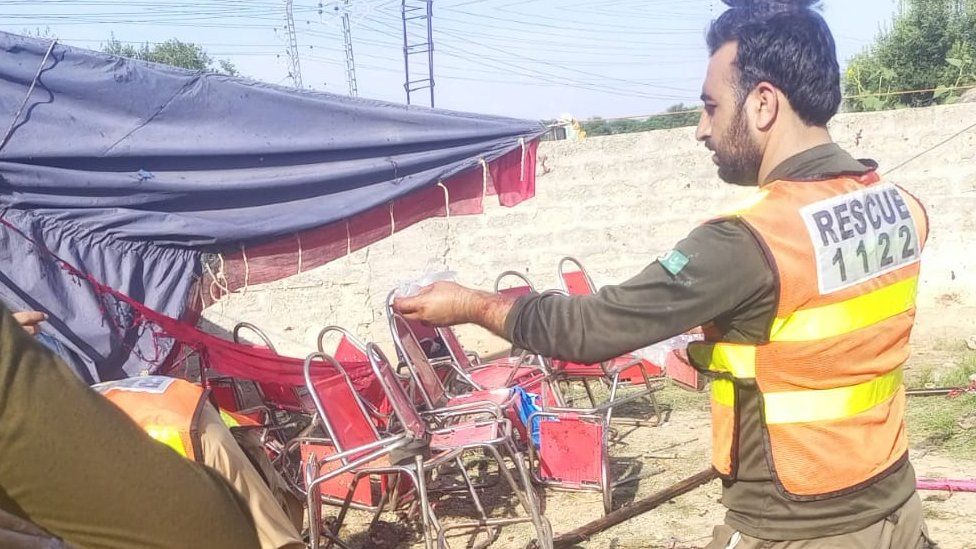 Rescue 1122 Bajaur
Rescue 1122 BajaurAt least 35 people have been killed in an explosion in Pakistan during a rally organised by an Islamist party.
Dozens of people were also injured in the explosion in north-west Bajaur district, where Jamiat Ulema-e-Islam-Fazl (JUI) was holding a meeting.
Authorities have cordoned off the area and have warned the death toll is likely to rise further.
A rescue operation to assist the injured is ongoing and police have not yet confirmed the cause of the blast.
Images being broadcast on local TV show ambulances ferrying injured people to hospitals in the Pakistani tribal district of Bajaur, in Khyber Pakhtunkhwa province near the border with Afghanistan.
Some badly injured people have been waiting in the hallways of health clinics struggling to cope with the high number of casualties.
The authorities have declared a health emergency at the district hospital.
A regional leader of the JUI, Maulana Ziaullah, was killed in the blast, local officials have said.
Related Topics
Italy joining China’s Belt and Road Initiative was atrocious move, defence minister says
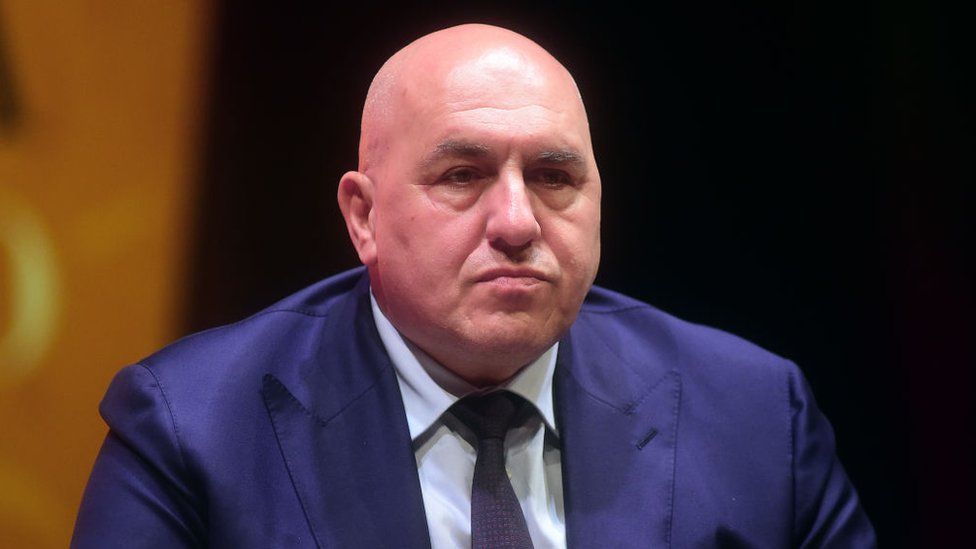 Getty Images
Getty ImagesItaly made an “improvised and atrocious” decision in joining China’s Belt and Road (BRI) initiative, defence minister Guido Crosetto has said.
Mr Crosetto claimed the initiative had done little to boost Italy’s exports, making China the only winner.
China has previously said both nations have seen “fruitful results” as a result of the BRI.
Italy became the first developed economy to join the BRI in 2019 – a move criticised by its Western allies.
The global investment programme envisions connecting China with Europe and beyond through rebuilding the old Silk Road trade route.
Under it, China provides funding for major infrastructure projects around the world, in a bid to speed Chinese goods to markets further afield.
Critics see it as a tool for China to spread influence. Both the EU and the US expressed concern when Italy decided to join the scheme four years ago.
“The decision to join the [new] Silk Road was an improvised and atrocious act” that increased Chinese exports to Italy without having the same effect on Italian exports to China, Mr Crosetto told Italian newspaper Corriere della Sera.
He said Italy now needs to work out how to get out of the deal without damaging relations with Beijing.
“The issue today is: how to walk back (from the BRI) without damaging relations [with Beijing]. Because it is true that China is a competitor, but it is also a partner,” Mr Crosetto said.
As Beijing had become increasingly assertive on the world stage, Italy would have to think about how to withdraw “without producing disasters”, he said.
There has been intense discussion about whether Italy should remain in the BRI since May, when Prime Minister Giorgia Meloni said she wanted talks with China about possibly withdrawing.
It is set to be automatically renewed in March 2024 unless Italy makes a formal request to withdraw from it by December this year.
China’s foreign ministry previously said it believed “China and Italy should further explore their cooperation potential” under the BRI and “strengthen mutually beneficial cooperation to seek more fruitful cooperation results.”
In comments quoted in the English language edition of the state-affiliated Global Times newspaper in May, foreign ministry spokesperson Wang Wenbin added that the two nations have seen “fruitful results” in many fields as a result of the BRI.
Beijing has since launched a diplomatic campaign to try to persuade Italy to renew the deal by sending senior officials to the country to lobby its case.
This video can not be played
To play this video you need to enable JavaScript in your browser.
Related Topics
-
-
23 March 2019
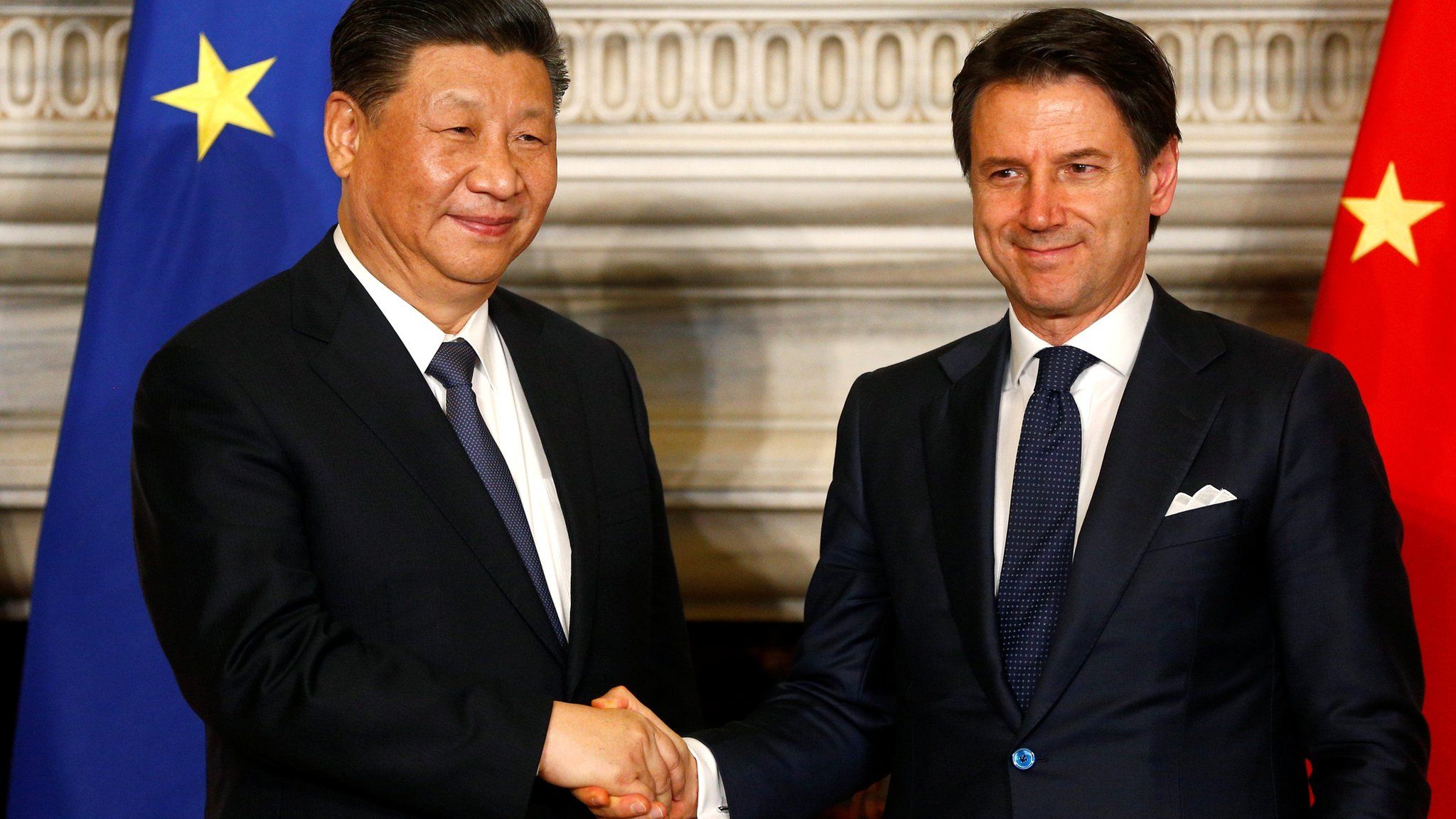
-
-
-
29 September 2021

-
-
-
6 January 2022
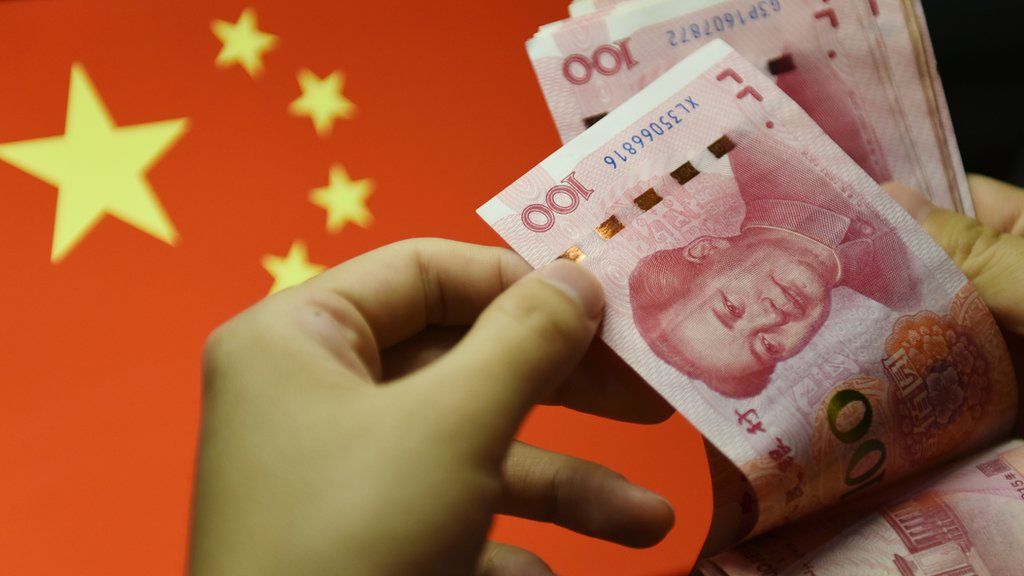
-
-
-
12 May 2017
2:36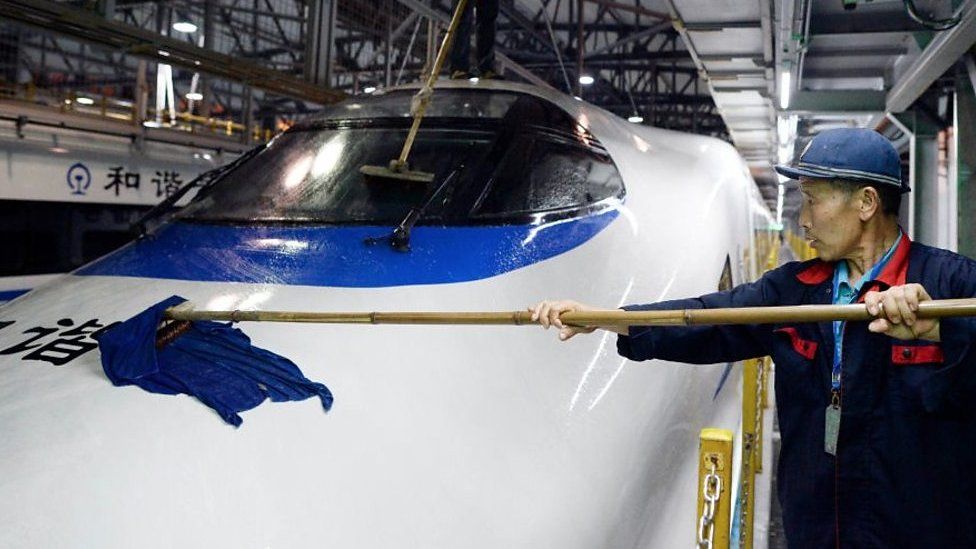
-
Lead caretaker party wants to be in next govt
PUBLISHED : 30 Jul 2023 at 18:35

The Palang Pracharath Party (PPRP), which leads the caretaker government, would accept the chance to join the next coalition government if it is invited, said its secretary-general.
“PPRP’s chance will come when a prime minister is installed and they invite us to join the government,” Thamanat Prompow said on Sunday. He was voted PPRP secretary-general just after its leader Prawit Wongsuwon resigned.
Representatives of PPRP met executives of the Pheu Thai Party last week and PPRP has not been contacted since, Capt Thamanat said.
Pheu Thai is taking the lead in forming the next government after Pita Limjaroenrat, leader of the Move Forward Party (MFP), failed to win a parliamentary vote for the prime minister’s post on July 13.
MFP and Pheu Thai are the two key parties in their eight-party coalition alliance which has 312 of 500 House representatives. Their House votes could not make a majority vote when both elected House representatives and 249 military-appointed senators voted for prime minister on July 13.
Asked if any parties outside the eight-party alliance would vote for a prime ministerial candidate from Pheu Thai, Capt Thamanat did not give an answer but said his party would prefer to wait for all factors to become clear first.
He expected clear directions on Tuesday and said a prime minister should be elected on either Friday or Aug 15. He did not elaborate.
Capt Thamanat denied that his return as PPRP’s secretary-general was meant to prepare the party to join the next coalition government. The party was restructured for its own growth, he said.
Asked about the possibility of PPRP working together with Pheu Thai, he said that PPRP MPs were formerly affiliated with Pheu Thai, so PPRP will not have any problem if it joins the next coalition government.
Capt Thamanat was among 21 former PPRP MPs who were expelled from the party. He returned to the party early this year. PPRP won 40 House seats in the May 14 election, coming fourth after MFP, Pheu Thai and the Bhumjaithai Party.
Let Presidential Elections Committee do their job, don’t put pressure on them: George Goh
“I think PEC has a big job as there are two candidates currently who will go through the deliberative track,” said Mr Goh, referring to Mr Ng and himself. Mr Ng’s application falls under the public sector deliberative track. This track is for those who claim to have experience and abilityContinue Reading
52 warehouses to be scanned after fatal explosion
PUBLISHED : 30 Jul 2023 at 17:34

NARATHIWAT: Security officials have been ordered to examine 52 other warehouses in this southern border town after a huge fireworks explosion at a godown in Sungai Kolok district on Saturday, leaving 12 people killed, 121 injured and nearly 300 houses damaged, about 50 of them totally destroyed.
Lt Gen Santi spoke after visiting a relief centre set up on the sports field of the Muno tambon administration organisation in Sungai Kolok, where he was briefed on the explosion.
He said some 52 other warehouses in the provinces must be examined to see whether they were built with valid permission and had been properly used to prevent a recurrence of the Saturday incident.
Explosive ordnance disposal teams should thoroughly scan the site of the explosion to determine the quantity of fireworks stored illegally in the warehouse. It was initially believed at least 5 tonnes of fireworks had been kept there, judging from the two deep holes left at the site by the powerful blast, Lt Gen Santi said.
Pol Maj Gen Anurut Im-ab, the Narathiwat police chief, said the owner of the godown would be charged with recklessness causing deaths and injuries under the Criminal Code and the laws on arms, ammunition and explosives.
Pending further investigation, the warehouse owner, who has been summoned to report to police, may also be charged for violating the Factory Act of 1992 and the Labour Protection Act of 1998.
3rd biggest party doesn’t want election winner in coalition
PUBLISHED : 30 Jul 2023 at 17:24

The Bhumjaithai Party will not join a coalition government if it includes the Move Forward Party (MFP), Bhumjaithai leader Anutin Charnvirakul confirmed on Sunday.
The leader of the party which came third in the May 14 election with 71 House seats said that Bhumjaithai stood firm with its same old standpoint that it would not join a coalition government if the formation included MFP.
MFP won the general election with 151 House seats. It tried to form the next government with seven other political parties. The Pheu Thai Party which came second in the polls with 141 House seats was the other big ally in the coalition group.
“If the eight-party alliance remains as declared in the MoU, the ninth ally will never be Bhumjaithai. Please rest assured,” said Mr Anutin who is also caretaker deputy prime minister and public health minister.
The eight-party alliance had 312 House votes.
Mr Anutin said he never heard of any initiative to form a coalition government with nine political parties to obtain a majority vote for prime minister from 500 MPs in the elected House and the Senate with 249 senators.
Since he discussed coalition government formation with Pheu Thai on July 22, he has not been contacted to have a talk on this issue again, Mr Anutin said.
Mr Anutin refused to comment on the possibility of the MFP being excluded from the next coalition government.
Meanwhile, MFP list MP Wiroj Lakkhanaadisorn wrote on Facebook that there were many rumours that the MFP would be excluded from the coalition alliance and made an opposition party, and he considered them as efforts to divide the eight-party alliance.
Without the MFP, a coalition government would not be able to answer questions from the people, he wrote.
Prasert Chanthararuangthong, secretary-general of the Pheu Thai Party, said the eight hopeful coaltion parties will meet officially before the parliament again votes for prime minister, possibly on Aug 4 (Froday).
On July 13 MFP leader and prime ministerial candidate Pita Limjaroenrat failed to win a majority vote from the parliament to become prime minister. On July 19 the parliament rejected his renomination.
Eight trapped in illegal Indonesia gold mine feared dead
Sudarsa said the rescue effort would continue until Tuesday in the hope of retrieving the miners’ bodies, which are yet to be found. Authorities had planned to deploy divers to find the miners but local rescue official Priyo Prayudha Utama told AFP “it was not possible” because the mine shaftContinue Reading
Policy issues behind Move Forward’s failure to form govt: poll
PUBLISHED : 30 Jul 2023 at 15:00

Most people are of the opinion that the Move Forward Party failed in a bid to form a government and the nomination of its leader Pita Limjaroenrat for prime minister because of its being adamant not to leave out some of its policies, according to an opinion survey by the National Institute of Development Administration, or Nida Poll.
Most people think the Move Forward Party (MFP) failed in a bid to form a government with its leader Pita Limjaroenrat as prime minister because of its insistence not to compromise on some of its policies, according to an opinion survey by the National Institute of Development Administration, or Nida Poll.
The poll was conducted on July 24-26 by telephone interviews with 1,310 people aged 18 and over of various levels of education, occupations and incomes throughout the country.
Asked which mistakes had led to the MFP’s failure to form a government and elect Mr Pita as prime minister, the answers varied as follows:
• 42.98% said the MFP refused to drop some of its policies in exchange for more support
• 30.46% did not think the MFP had made any mistakes
• 27.56% said the MFP was defeated in a political game in parliament
• 11.68% said the MFP had been reclusive, causing it to have no political allies
• 10.23% said the MFP had no true understanding of Thai political culture
• 9.54% said the MFP was not careful enough about the qualifications of its prime ministerial candidate
• 7.94% said the MFP had made a lot of political enemies
• 7.86% said some of its supporters’ behavior deprived the MFP of support in parliament
• 7.56% said the MFP relied too much on its supporters’ groups
• 6.11% said the MFP was too complacent about its 14 million votes and 151 MPs
• 5.88% said the MFP’s advisers miscalculated the situation
• 0.53% had no answer or were not interested
Asked whether political protests would erupt if the MFP ended up being in opposition, the answers were:
• 35.19% said there would be major rallies, but controllable
• 24.81% said there would be small rallies and controllable
• 23.16% said there would be major rallies that could get out of control
• 11.99% said there would not be any rally
• 2.90% said there would be some small rallies, but they would be uncontrollable
• 1.45% had no answer or were not interested
The MFP formed an alliance with the Pheu Thai and six other smaller parties, with a total of 312 MPs, to form a government. Mr Pita of the MFP was nominated for the post of prime minister in the first parliamentary voting on July 13, but he failed to get enough support from the Senate to secure the 375 votes needed for approval.
Policy issue behind Move Forward’s failure to form govt: poll
PUBLISHED : 30 Jul 2023 at 15:00

Most people are of the opinion that the Move Forward Party failed in a bid to form a government and the nomination of its leader Pita Limjaroenrat for prime minister because of its being adamant not to leave out some of its policies, according to an opinion survey by the National Institute of Development Administration, or Nida Poll.
Most people think the Move Forward Party (MFP) failed in a bid to form a government with its leader Pita Limjaroenrat as prime minister because of its insistence not to compromise on some of its policies, according to an opinion survey by the National Institute of Development Administration, or Nida Poll.
The poll was conducted on July 24-26 by telephone interviews with 1,310 people aged 18 and over of various levels of education, occupations and incomes throughout the country.
Asked which mistakes had led to the MFP’s failure to form a government and elect Mr Pita as prime minister, the answers varied as follows:
• 42.98% said the MFP refused to drop some of its policies in exchange for more support
• 30.46% did not think the MFP had made any mistakes
• 27.56% said the MFP was defeated in a political game in parliament
• 11.68% said the MFP had been reclusive, causing it to have no political allies
• 10.23% said the MFP had no true understanding of Thai political culture
• 9.54% said the MFP was not careful enough about the qualifications of its prime ministerial candidate
• 7.94% said the MFP had made a lot of political enemies
• 7.86% said some of its supporters’ behavior deprived the MFP of support in parliament
• 7.56% said the MFP relied too much on its supporters’ groups
• 6.11% said the MFP was too complacent about its 14 million votes and 151 MPs
• 5.88% said the MFP’s advisers miscalculated the situation
• 0.53% had no answer or were not interested
Asked whether political protests would erupt if the MFP ended up being in opposition, the answers were:
• 35.19% said there would be major rallies, but controllable
• 24.81% said there would be small rallies and controllable
• 23.16% said there would be major rallies that could get out of control
• 11.99% said there would not be any rally
• 2.90% said there would be some small rallies, but they would be uncontrollable
• 1.45% had no answer or were not interested
The MFP formed an alliance with the Pheu Thai and six other smaller parties, with a total of 312 MPs, to form a government. Mr Pita of the MFP was nominated for the post of prime minister in the first parliamentary voting on July 13, but he failed to get enough support from the Senate to secure the 375 votes needed for approval.
Death toll rises to at least 10 in Thai warehouse explosion
BANGKOK: The death toll from a powerful explosion that levelled an unlicensed fireworks warehouse in southern Thailand rose to at least 10 on Sunday (Jul 30), the local governor said as police sought the owner on charges of negligence. The blast on Saturday afternoon in the town of Sungai KolokContinue Reading

